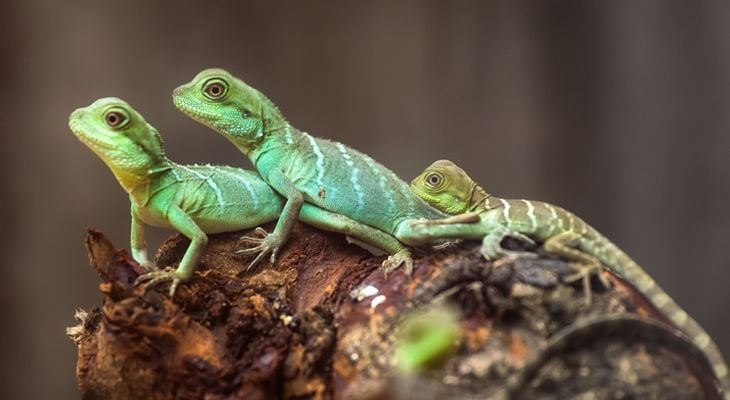Do you know how to keep your pet safe this winter?
Read more

People with limited living quarters may find that reptiles such as lizards or turtles fit perfectly into their lifestyles. Before deciding on a reptile, learn as much as possible about them and their needs. Poisonous snakes and certain reptiles should never be kept as pets. Ask your veterinarian about the suitability of a particular animal before you make your decision. There are many things to consider before committing to a reptile as a pet.
Finding out if a Pet is Legal Where You Live
Many areas have enacted laws pertaining to keeping reptiles. Some are general and some are quite specific; in many places any reptiles that are considered dangerous (venomous snakes, alligators, etc.) are illegal but some places are even more restrictive (for example, in some states all constricting snakes including ball pythons are illegal).
Salmonella Risks and Prevention
All reptile owners need to be informed about Salmonella infections. While the risks shouldn't keep most people from keeping reptiles since with the proper management the risks are minimal. Still, owners should be aware of the risks, and the US Centers for Disease Control recommends that certain risk groups should be careful about contact with reptiles and amphibians.
The Importance of Light and Heat
Many problems with keeping reptiles can be traced back to not providing the proper environmental conditions, particularly heat. Proper lighting is also important for many reptiles. The equipment to provide the proper heat and light to captive reptiles is often quite expensive, but is absolutely essential to keeping pet reptiles healthy. It is important to find out exactly what conditions your reptile needs and never cut corners when it comes to meeting those conditions!
Why Choose Captive Bred Reptiles
There are numerous reasons why you should pick a captive bred reptile if at all possible, as explained here.
How to Pick a Healthy Reptile
It is important to keep in mind that depending on where you get a reptile, it may be very stressed, dehydrated, and prone to illness. Here are some items to look for when buying your reptile to increase the chances of picking out a healthy pet reptile.
While there are many types of reptiles that could be good pets, here we cover a few you could consider.
-
Cold Weather Pet Safety
Category: Newsletter Library, Seasonal Topics
-
Keep Your Pet Safe During the Holidays
Category: Newsletter Library, Seasonal Topics
-
November is Pet Cancer Awareness Month
Category: Newsletter Library, Seasonal Topics
-
How to Treat Common Injuries in Your Dog
Category: Newsletter Library, Tips for Pet Owners
-
Safety Guidelines for Pet Costumes
Category: Newsletter Library, Seasonal Topics
-
Anemia in Dogs
Category: Newsletter Library, Keeping Pets Healthy
-
How to Treat Common Paw Problems in Dogs
Category: Newsletter Library, Keeping Pets Healthy
-
Teaching Your Child to Care For Their First Pet
Category: Newsletter Library, Tips for Pet Owners
Is a new pet in your family's future? These tips will help your child learn pet care essentials.
Read more -
July is National Lost Pet Prevention Month
Category: Newsletter Library, Seasonal Topics
A lost pet is every pet owner's worst nightmare. These tips can help you keep your furry friend safe.
Read more -
Summer Paw Care For Hot Pavement and Exercise Outside
Category: Newsletter Library, Seasonal Topics
-
Managing Your Cat's Night-Time Activity
Category: Newsletter Library, Cats
Does your cat enjoy midnight sprints through your home? These tips can help curb the behavior.
Read more -
Common Pet Skin Issues and How to Treat Them
Category: Newsletter Library, Tips for Pet Owners
-
Keeping Your Pets Safe During Flea and Tick Season
Category: Newsletter Library, Fleas & Parasites
-
Pawty with Your Pet - National Dog Party Day
Category: Newsletter Library, Seasonal Topics
-
What To Know About Bathing and Grooming Your Dog
Category: Newsletter Library, Tips for Pet Owners
-
Managing Your Pet’s Anxiety
Category: Newsletter Library, Behavior & Training
